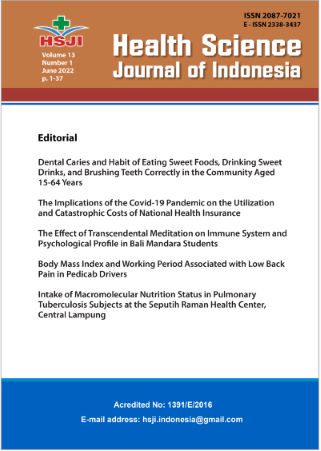The Implications of The Covid-19 Pandemic on The Utilization and Catastrophic Costs of National Health Insurance
Abstract
Background: The COVID-19 pandemic in Indonesia has significantly impacted the health care system and insurance schemes. Social distancing policies during the pandemic have led to changes in utilization in health facilities, especially those related to catastrophic diseases that cost a lot of money. This study aims to analyse the impact of the Covid-19 pandemic on the utilization and financing of catastrophic diseases in the National Health Insurance (NHI) program.
Methods: The research design is quantitatively and qualitatively. The quantitative study analysed secondary data obtained from the Social Security Administrator for Health and the nat. This study also has qualitative data from in-depth interviews with government and private hospital informants, health economists, and social health insurance experts.
Results: COVID-19 pandemic has impacted decreasing the utilization of National Health Insurance participants to health facilities and significantly affecting the financing of catastrophic diseases. Before pandemic, the disease with the highest claim fee was ischemic heart disease, and after the pandemic, the disease with the highest claim fee was chronic kidney disease. There is also a change in the ranking diseases pattern before and during the covid-19 pandemic.
Conclusion: In the future, National Health Insurance financing needs to expand the scope of the benefits of preventive and promotive services, especially the prevention of catastrophic diseases, to reduce the burden of NHI claims. Health facilities provided by National Health Insurance providers need to prepare for better management of health services after the pandemic.
Full text article
References
2. Liu Y, Lee JM, Lee C. The challenges and opportunities of a global health crisis: the management and business implications of COVID-19 from an Asian perspective. Asian Business & Management. 2020; 1.
3. Gössling S, Scott D, Hall CM. Pandemics, tourism and global change: a rapid assessment of COVID-19. Journal of sustainable tourism. 2020;29(1): 1–20.
4. Nugraheni WP. Studi Kualitatif Manajemen Penanganan Covid-19. 2020.
5. Ng K, Poon BH, Kiat Puar TH, Shan Quah JL, Loh WJ, Wong YJ, et al. COVID-19 and the risk to health care workers: a case report. Annals of internal medicine. 2020;172(11): 766–767.
6. BPJS Kesehatan. Data Klaim BPJS Kesehatan 2018. Jakarta: Badan Pelenyelenggara Jaminan Sosial Kesehatan; 2019.
7. FKKMK UGM. Surplus BPJS Kesehatan dan Dampknya. Universitas Gajah Mada.
8. Cutler DM. How COVID-19 Changes the Economics of Health Care. JAMA Health Forum. 2021;2(9): e213309. https://doi.org/10.1001/jamahealthforum.2021.3309.
9. Ahn S, Kim S, Koh K. Changes in Healthcare Utilization, Spending, and Perceived Health during COVID–19: A Longitudinal Study from Singapore. SSRN Electronic Journal. 2020; https://doi.org/10.2139/ssrn.3669090.
10. Grunau B, Helmer J, Lee S, Acker J, Deakin J, Armour R, et al. Decrease in emergency medical services utilization during early stages of the COVID-19 pandemic in British Columbia. Canadian Journal of Emergency Medicine. 2021;23(2): 237–241. https://doi.org/10.1007/s43678-020-00062-y.
11. Xiao H, Dai X, Wagenaar BH, Liu F, Augusto O, Guo Y, et al. The impact of the COVID-19 pandemic on health services utilization in China: Time-series analyses for 2016–2020. The Lancet Regional Health - Western Pacific. 2021;9: 100122. https://doi.org/10.1016/j.lanwpc.2021.100122.
12. Robinson BM, Guedes M, Alghonaim M, Cases A, Dasgupta I, Gan L, et al. Worldwide Early Impact of COVID-19 on Dialysis Patients and Staff and Lessons Learned: A DOPPS Roundtable Discussion. Kidney medicine. 2021;
13. Gordon CE, Berenguer MC, Doss W, Fabrizi F, Izopet J, Jha V, et al. Prevention, diagnosis, evaluation, and treatment of hepatitis C virus infection in chronic kidney disease: synopsis of the kidney disease: improving global outcomes 2018 clinical practice guideline. Annals of internal medicine. 2019;171(7): 496–504.
14. Purnamasari D. The Emergence of Non-communicable Disease in Indonesia. Acta Medica Indonesiana. 2019;50(4): 273.
15. Hafizurrachman M, Hartono RK. Junk Food Consumption and Symptoms of Mental Health Problems: A Meta-Analysis for Public Health Awareness. Kesmas: National Public Health Journal. 2021;16(1). https://doi.org/10.21109/kesmas.v16i1.4541.
16. Hartono RK, Hamid SA, Hafizurrachman M. Do the Number of Cigarettes Smokes per Day Contribute to the Incident of Malignant Cancer? Asian Pacific journal of cancer prevention: APJCP. 2019;20(5): 1403–1408. https://dx.doi.org/10.31557%2FAPJCP.2019.20.5.1403
17. Republic of Indonesia. Peraturan Presiden Republik Indonesia Nomor 82 Tahun 2018 Tentang Jaminan Kesehatan. Jakarta: Indonesia Republic; 2018.
18. Hartono RK, Hamid SA, Hafizurrachman. Could National Health Insurance Prevent Overweight? A Case Study in Indonesia. In: Proceedings of the 5th Universitas Ahmad Dahlan Public Health Conference (UPHEC 2019). Paris, France: Atlantis Press; 2020. https://doi.org/10.2991/ahsr.k.200311.007.
19. Angelis A, Lange A, Kanavos P. Using health technology assessment to assess the value of new medicines: results of a systematic review and expert consultation across eight European countries. The European Journal of Health Economics. 2018;19(1): 123–152.
20. Schwarzkopf L, Menn P, Leidl R, Wunder S, Mehlig H, Marx P, et al. Excess costs of dementia disorders and the role of age and gender - an analysis of German health and long-term care insurance claims data. BMC health services research. 2012. p. 165. https://doi.org/10.1186/1472-6963-12-165.
21. BPJS Kesehatan. Pandemi Covid-19 Dorong Inovasi Layanan Digital BPJS Kesehatan. https://bpjs-kesehatan.go.id/bpjs/post/read/2021/2066/Pandemi-Covid-19-Dorong-Inovasi-Layanan-Digital-BPJS-Kesehatan [Accessed 24th November 2021].
22. Yoo SM, Chung SH, Jang WM, Kim KC, Lee JY, Kim SM. New obligations of health insurance review and assessment service: Taking full-fledged action against the covid-19 pandemic. Journal of Preventive Medicine and Public Health. 2021;54(1): 17–21. https://doi.org/10.3961/JPMPH.20.594.
23. Mahendradhata Y, Andayani NLPE, Hasri ET, Arifi MD, Siahaan RGM, Solikha DA, et al. The capacity of the Indonesian healthcare system to respond to COVID-19. Frontiers in public health. 2021;9: 887.
24. Nugraheni WP, Hidayat B, Nadjib M, Pambudi ES, Kosen S, Trihandini I, et al. Impact Evaluation of National Health Insurance toward Access Hospital Inpatient Care in Indonesia. SCOPUS IJPHRD CITATION SCORE. 2018;9(2): 196.
25. Nugraheni WP, Zahroh AH, Hartono RK. BEST PRACTICE OF HOSPITAL MANAGEMENT STRATEGY TO THRIVE IN THE NATIONAL HEALTH INSURANCE (JKN) ERA. Jurnal Administrasi Kesehatan Indonesia. 2021;9(1): 9. https://doi.org/10.20473/jaki.v9i1.2021.9-22.
Authors
Copyright (c) 2022 Wahyu Pudji Nugraheni, Syarifah Nuraini, Risky Kusuma Hartono

This work is licensed under a Creative Commons Attribution-NonCommercial-ShareAlike 4.0 International License.

